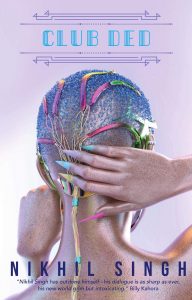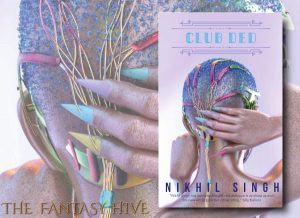CLUB DED by Nikhil Singh (BOOK REVIEW)
“She calls them messages from the deep. Not the voices of individuals. These are the voices of cities. Cities sometimes speak through people. Did you know that cities speak through people? Well, of course you do. You’re always trying to feed yours lines… I suppose, even I can hear the cities talking, sometimes…”
Nikhil Singh’s Club Ded is a remarkable and original work of near-future post-cyberpunk science fiction. Set in a media-saturated South Africa inhabited by washed-out movie stars, prescient drug cults and itinerant pickpockets, Singh’s novel is a hallucinogenic masterpiece and a brilliantly brutal dissection of neo-colonialism. Operating in a cyberpunk milieu reminiscent of Pat Cadigan, Singh expertly weaves together a complicated plot with a dizzying array of characters. The novel is told in a unique way, Singh’s sharp staccato prose and quick changes in perspective recalling the jump-cuts that made 90s music videos so frenetic. In less assured hands the book would be in danger of being a mess, but Singh is an artist in masterful control of his material. Challenging, disorienting, and full of dark humour, Club Ded is a vital and urgent work of speculative fiction and signals Singh’s arrival as an exciting voice in the genre.
 In the 90s, Brick Bryson was an iconic African-American action movie star, his leading role in Delany Croeser’s hugely popular high-concept sci-fi film Game Over earning him both popularity and artistic respect. Now he’s a has-been, just coming out of rehab. So when his old drinking buddy Croeser invites him to come to South African and help out with the filming of the latest film in the franchise, Club Ded, Brick sees an opportunity to get his career back on track. He soon finds himself trying to save a disaster of a film and wrangle the franchise’s new stars, talented but surly Sasha Styles and the young and beautiful Delilah Lex who is in an inappropriate relationship with Croeser. What he doesn’t realise is that Croeser is involved in more than just an indefinitely delayed Hollywood sequel. Oracle, Inc., an all-female intelligence gathering operation, is spreading the influence of a psychedelic drug that allows users to see the future, and their operatives Jennifer, Anita and V are connected to Croeser’s film. Fortunato, a prodigiously talented Nigerian indie film director turned drug dealer, is flooding Cape Town with this drug, whilst disillusioned ex-New Yorker Ziq helps him manufacture it in between indulging his kleptomania and his deranged friend Jaybird’s pyromania. There is a real Club Ded, a secret realm of lawless abandon that makes even Cape Town look tame by comparison, and as the various characters struggle to figure out what’s going on, events spiral out of everyone’s control.
In the 90s, Brick Bryson was an iconic African-American action movie star, his leading role in Delany Croeser’s hugely popular high-concept sci-fi film Game Over earning him both popularity and artistic respect. Now he’s a has-been, just coming out of rehab. So when his old drinking buddy Croeser invites him to come to South African and help out with the filming of the latest film in the franchise, Club Ded, Brick sees an opportunity to get his career back on track. He soon finds himself trying to save a disaster of a film and wrangle the franchise’s new stars, talented but surly Sasha Styles and the young and beautiful Delilah Lex who is in an inappropriate relationship with Croeser. What he doesn’t realise is that Croeser is involved in more than just an indefinitely delayed Hollywood sequel. Oracle, Inc., an all-female intelligence gathering operation, is spreading the influence of a psychedelic drug that allows users to see the future, and their operatives Jennifer, Anita and V are connected to Croeser’s film. Fortunato, a prodigiously talented Nigerian indie film director turned drug dealer, is flooding Cape Town with this drug, whilst disillusioned ex-New Yorker Ziq helps him manufacture it in between indulging his kleptomania and his deranged friend Jaybird’s pyromania. There is a real Club Ded, a secret realm of lawless abandon that makes even Cape Town look tame by comparison, and as the various characters struggle to figure out what’s going on, events spiral out of everyone’s control.
Singh vividly paints a picture of near-future Cape Town through his cast of varied characters. Club Ded’s characters are frequently unsympathetic and some of them are truly monstrous, but they are all fully developed and believable as people. Singh takes time to make sure that you understand where these characters come from, and why they are making the choices they make, so that even his most reprehensible characters we understand. His characters come from a variety of ethnicities and backgrounds, which crucially gives us multiple views of the complexity of the society he is depicting. As his characters point out, South Africa still exists under the shadow of apartheid, and Singh expertly dissects how in many ways the attitudes, prejudices and tensions of apartheid never went away. Singh unflinchingly dissects the massive racial and material divides that still hold sway over South Africa, from the privileged wealthy white people from overseas who come to exploit the country’s cheap labour and feel the thrill of exoticism, to the wealthy white South Africans with their entrenched racism, to the black and white poor struggling to survive amongst the crime and corruption. There is an incredible scene in which most of the main characters are sharing a limousine, each of them talking about how they see South Africa, which largely boils down to how they can exploit it. The real, secret Club Ded is the grotesque endpoint of the neocolonial dream, a realm devoid of any kind of laws or regulation that exists as a playground for the rich and callous.
Club Ded is a brilliant reflection of our media-saturated present. Like all the best cyberpunk writers, Singh understands that mass media can be a uniquely powerful form of social control. Singh uses cinema as a metaphor, a theme and a structuring device all in one, his novel taking on the heightened reality of a film to explore the ways in which our experiences with media, be they film or the internet, shape our consensus reality. In Club Ded, information is currency, because how much you know completely changes how you perceive what you’re looking at. Hence why Oracle, Inc. sets up its predatory helplines to monitor the psychic undercurrent of the city, and why all of the novel’s characters feel the irresistible pull of Fortunato’s psychedelic drug that can reveal the future. Singh brilliantly plays this trick across the whole of the novel, his deft misdirection ensuring that the reader does not know what they are looking at until the dramatic reveal.
All of this might make Club Ded sound overly technical, but Singh populates his book with fascinating characters, all of whom have satisfying character arcs. From Jennifer’s fear of the premonition of her own death that she receives whilst under the influence of the drug, to Ziq’s doomed attempt to find meaning and belonging, to Brick’s own struggles with his own worst tendencies, Singh somehow brings all these characters to where they need to be, in tandem with the book’s shocking twists and clever resolution. For all of the novel’s density and complexity, it still manages to centre the humanity of its characters.
Club Ded is a challenging book, disorienting even to seasoned readers of speculative fiction, but the rewards of following Singh through are more than ample. It is a novel that deals with high concept SFnal ideas and cutting social observation alike, written in a unique and adventurous literary style by an artist with remarkable skill and control. It is a book that deserves to be widely read and discussed, and I look forward to wherever Singh’s muse takes him next.

